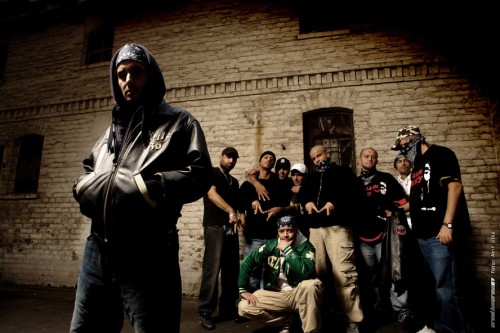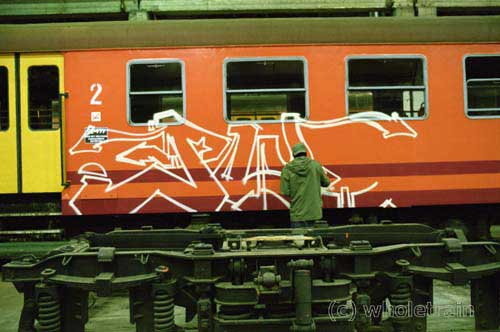Germany’s Young Muslims Turning To Hip-Hop To Express Their Feelings

In the mid 1990s, after bouncing in and out of prison, Killa Hakan joined the German rap group Islamic Force, a pioneer of Turkish immigrant hip-hop in Germany. The group only made one album before one of its founding members died and it disbanded, but it succeeded in channeling the frustration that so many Turkish immigrants in Germany were facing at the time.
“We had a lot of problems,” Hakan explained to Quartz on a Monday morning shortly before the new year. Hakan’s parents had moved to the Kreuzberg neighborhood of Berlin from Turkey more than four decades ago as guest workers. Like many Turkish workers who moved to Germany to help fill the country’s factories during that time, he said that his family assumed they would move back to Turkey and never made the effort to integrate.
He had little contact with native Germans, who he felt belittled Turkish culture, and his parents worked all the time to earn money. It left him feeling caught between two cultures. “My dad was only home long enough to eat something and hit me. There was never time to talk,” he said.
Hip-hop offered Hakan a way to express his feelings of alienation, but also gave him a bond to other marginalized groups outside of Germany. The American group Soulsonic Force inspired the name Islamic Force, which Hakan said had nothing to do with extremist religious ideology. Rather it was a way of connecting the plight of Turkish guest workers in Germany to the struggles of African Americans during the civil rights movement.
“As kids somehow we understood that our parents were also slaves of a kind,” said Hakan, now 42. “We wanted to start a movement here, but we also just wanted to make music.”
Hip-hop, which got its start in the US as a form of urban protest, quickly became “the voice of the European ghetto,” Hisham Aidi, author of Rebel Music: Race, Empire and the New Muslim Youth Culture, told me over the phone. “It is the music of the marginalized, transcending the nation state and national borders.”
When hip-hop first became popular in Germany in the 1980s, it helped the country’s Muslim immigrants express their plight with lonely anthems of exclusion and alienation. Over the decades, however, as the number of Muslim immigrants to Germany grew (one estimate forecasts that Germany’s Muslim population will expand by another 25% to 5.5 million by 2030), the country’s hip-hop artists have adopted a much harder, more strident tone.
Today as the country struggles to integrate millions of new Muslim immigrants, hip-hop is exposing the fault lines in Germany’s imperfect embrace of its immigrant population. While some artists are urging Germany to open itself up to migrants and accept them as an integral part of the social fabric, others are transmitting a violently anti-Western message. And that has the country’s political leadership worried, particularly after one rapper joined ISIL and served as a recruiter for the terrorist organization.
Marginalized
Hip-hop came to Germany by way of American groups like Public Enemy, music journalist and former record label owner explained to Quartz at a Turkish café off of Kottbusser Tor in the heart of Kreuzberg. Songs like “Fight the Power” spoke to people who felt outside of German society. “Hip-hop culture gave a voice to people in the society who weren’t otherwise represented,” Falk Schacht, a music journalist, hip-hop artist and record label owner told Quartz. They are saying “I am also here, listen to me.”
The genre grew quickly in Germany and evolved into its own hybrid. Hip-hop doesn’t require formal musical education or even instruments, so kids could teach themselves to rap just by listening to other artists, Staiger said. Artists began rapping in German, weaving expressions from Turkish, Arabic, and other languages into their music.
Advanced Chemistry was one of the first groups to start rapping in German, and its music borrows heavily from New York hip-hop. The group’s lyrics, however, tell a very German story. Despite having German citizenship, the group’s members, who have immigrant backgrounds, rap about not being seen as German. In the 1995 song “Fremd im eigenen Land” (“Foreign in my Own Country”), Advanced Chemistry raps that despite having a “passport with a golden eagle,” they are among the few who must show their passport when traveling or field questions like “Where are you really from?”
It was the kind of music that influenced Munich rapper Ali As when he was younger. As, whose parents come from Pakistan, could relate to the heavily slanged, street speech of the music, as well as the themes of alienation. “I remember walking through Goethe Platz in Munich when I was a kid with my mom and some drunks throwing pebbles at us because we were immigrants,” As told Quartz over the phone.
Still As had never considered a hip-hop career until 1999, when a friend and fellow rapper got him into the scene. At the time he had just started studying theater, but decided to break off his university studies. “It didn’t matter how German I was, how bourgeois, I was always treated like an outsider,” said As. “If no matter what I did, I would be treated as a colorful parrot, then I might as well do what I want.”
Ali As’ lyrics are sarcastic, peppered with references ranging from the Greek mythical character Icarus to actor Forest Whitaker, street artist Banksy, and the movie Psycho. His 2015 song “Deutscher/ Ausländer” (“Germans/ Foreigners”) calls out the hypocrisies of Germans, who say they are tolerant, while criticizing Islam. He raps about whiskey drinkers questioning the morality of those who study the Koran.
German gangster rap
Then there is Bushido, a wildly popular German rapper and label owner whose lyrics have been criticized for being misogynist and homophobic. Like other German rappers with immigrant backgrounds, Bushido, who has Tunisian father, plays off the idea of not fitting in. But he takes a more violent stand, provoking controversy and anxiety about his effect on German youth. In the 2013 song “Stress ohne Grund” (“Stress without Reason”), laced with sexist slurs, Bushido raps about killing prominent German politicians. The lyrics led to criminal charges, which were eventually dismissed, that he was inciting violence. That same year, major German newspapers wrote about Bushido’s alleged mafia ties with a businessman named Arafat Abou-Chaker.
Bushido actively cultivates an image that borders on extremist, but in interviews he says he’s being provocative to sell albums. In the 2006 song, “11.September” he raps about “being the Taliban,” and the similarities he shares with terrorists. Most in Germany don’t know what to make of him. He actually won an award for his integration efforts in 2011.
In January 2015, Staiger spoke with Bushido shortly after he caused a firestorm for posting on Twitter a picture of himself wearing a sweatshirt with the word “Paris” and the caption in German, “Things are going to kick off soon,” right after the terrorist attacks on French satire magazine Charlie Hebdo. In the interview, Bushido says the tweet had nothing to do with the attacks—he insists he was talking about his upcoming album. He also openly talks about his Muslim faith, while condemning extremist ideology, saying that he is “not the Taliban.” He told Staiger that he feels under threat because of how he looks and his faith. “My belief creates more problems for me on earth,” he says in the video interview, mentioning how the tweet only caused a fuss because he is not white and Muslim.
Staiger says that regardless of how seriously Bushido takes himself, others should take seriously his influence on Muslim youth in Germany. His impact is something that street social worker Olad Aden has seen first hand. Under the auspices of Gangway, a non-profit that helps young Berliners in difficult circumstances straighten out their lives, Aden started a program where kids produce their own hip-hop albums. Aden got the idea because as soon as many of the kids he works with first meet him, they start spitting lyrics from rappers like Bushido, assuming that he is a hip-hop fan because he is African-American.
“They think African-American culture is all about bitches, hoes, crack, and guns,” said Aden from his modest office in Wedding, another immigrant Berlin enclave. “There is a certain fascination with the image of toughness with hip-hop in Berlin; everyone wants to be the toughest, craziest, hardest.”
Respect
The need to be taken seriously and given respect pervades much of the music of immigrant rappers. Over time, as German rap has moved from the underground to the mainstream, how that need for respect is expressed in rap has evolved. If Advanced Chemistry was talking about having their identity not questioned at every turn, today’s German rappers are becoming more forceful, creating their own worlds where they run the show.
Sékou Neblett, a rapper who worked with Staiger and Schacht to make a film called “Blacktape” about the origins of German rap, told Quartz that artists today want to cultivate an image of empowerment. “In society there are victims and perpetrators—no one wants to be a victim.”
Hakan, who has made a number of solo albums since his debut with Islamic Force, also wants to be seen as tough and in control, but his universe is more narrow. His 2014 song “Ghetto Insider” is about his status in Kreuzberg. As a teenager Hakan joined a Kreuzberg gang made up of primarily immigrant youth called the 36Boys, named after the area’s old postal code. He told me he got the nickname Killa at the age of 15 because he keeps his word. “I’m honest, correct,” he said. “But if you want a fight, I won’t back down from that either.”
Victim is the word that Hakan uses to describe one of the German rap’s most infamous characters—Deso Dogg. Mainstream media portray Deso Dogg as an up-and-coming German rapper before he joined the Islamic State (ISIL). A 2011 New York Times profile says he toured with DMX and worked on a soundtrack for a German film. Hakan and everyone else Quartz spoke with for this story said that Deso Dogg, who was from Berlin, wasn’t part of the country’s rap scene, but instead an unsuccessful rapper looking for direction. One part of the story everyone agrees on is that after a near death experience in a car accident, he gave up rap and started writing propaganda for ISIL.
Most stories about Deso Dogg say that his ability to connect with disaffected youth made him a successful recruiter for the terrorist group. It also made politicians worried about hip-hop music disseminating extremist viewpoints, said Aidi. “A lot of politicians want to blame art, and music for being a radicalizer, because they don’t want to talk about policy,” he said. “It’s much easier to blame the culture.”
Migrant crisis
More recently, groups like K.I.Z, Antilopen Gang, and Zugezogen Maskulin have turned the tables using harsh language to point the finger at German politicians and even mainstream society for turning their back on refugees arriving in the country. More than one million refugees arrived in the country last year.
The title of Düsseldorf-based Antilopen Gang’s 2014 song, “Beate Zschäpe hört U2″ (“Beate Zschäpe listens to U2”), references a ring wing extremist on trial for a series of racially motivated murders. In the hit they rap about how anti-immigrant sentiment has become pervasive in society, comparing ordinary Germans worried about their pensions going to refugee care to Nazis.
The 2015 song “Oranienplatz,” from the Berlin rap duo Zugezogen Maskulin, talks about the Kreuzberg square where refugees had set up camp for two years before being cleared by city officials. The song sharply criticizes the cynicism of Germans in the face of the refugee crisis, worrying about whether to buy Nike or Adidas shoes while refugees take to boats to escape dire circumstances. The lyrics are piercing and sarcastic: “This is a golden land, don’t get anything dirty,” they rap. “We have much too much to give you anything.”
In their graphic video for “Boom Boom Boom,” the first single from their 2015 album Hurra die Welt geht unter (Hooray the world is coming to an end), K.I.Z.’s members act out scenes of torture in an underground bunker and a lynching in an open field while rapping about German xenophobia and racism. “The lynch mob is sick with jealousy about 5-star hotel where asylum seekers live,” the Berlin based artists rap in reference to attacks on asylum homes throughout Germany. “Do you think that refugees boarded a party boat with big dreams of dealing drugs in the park?”
Still even as German hip-hop becomes more hard-edged, it’s also growing more popular, diluting the messages of urban protest. Today most fans don’t take the political messages that seriously, said Staiger. “You hear this music at every university graduation party,” he said.
In an interview with Fluter, a youth magazine published by the Federal Agency for Civic Education, members of K.I.Z talk about how their music takes on current politics, like Germany’s anti-Islamic group Pegida, but address a general longstanding attitude in the country that they believe won’t change anytime soon. “I would naturally be happy if someone takes it to heart,” rapper Maxim says in the interview about the lyrics for “Boom Boom Boom.” “I don’t have high hopes for that.”
Renuka Rayasam is a freelance writer based out of Berlin. You can follow her at @renurayasam.
[VIA QZ.COM]



